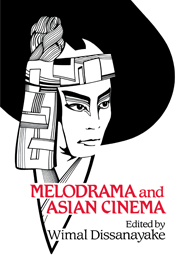Book contents
- Frontmatter
- Contents
- List of contributors
- Acknowledgments
- I Introduction
- II Melodrama / subjectivity / ideology: Western melodrama theories and their relevance to recent Chinese cinema
- III Symbolic representation and symbolic violence: Chinese family melodrama of the early 1980s
- IV The Goddess: Reflections on melodrama East and West
- V Melodrama as historical understanding: The making and unmaking of communist history
- VI Melodrama, postmodernism, and Japanese cinema
- VII Inscribing the subject: The melodramatization of gender in An Actor's Revenge
- VIII Insides and outsides: Cross-cultural criticism and Japanese film melodrama
- IX Psyches, ideologies, and melodrama: The United States and Japan
- X Negotiating the transition to capitalism: The case of Andaz
- XI The concepts of evil and social order in Indian melodrama: An evolving dialectic
- XII Politics of melodrama in Indonesian cinema
- XIII Power, pleasure, and desire: The female body in Filipino melodrama
- XIV The register of nightmare: Melodrama as it (dis)appears in Australian film
- XV Overview: What is American about film study in America?
- Index
II - Melodrama / subjectivity / ideology: Western melodrama theories and their relevance to recent Chinese cinema
Published online by Cambridge University Press: 05 June 2012
- Frontmatter
- Contents
- List of contributors
- Acknowledgments
- I Introduction
- II Melodrama / subjectivity / ideology: Western melodrama theories and their relevance to recent Chinese cinema
- III Symbolic representation and symbolic violence: Chinese family melodrama of the early 1980s
- IV The Goddess: Reflections on melodrama East and West
- V Melodrama as historical understanding: The making and unmaking of communist history
- VI Melodrama, postmodernism, and Japanese cinema
- VII Inscribing the subject: The melodramatization of gender in An Actor's Revenge
- VIII Insides and outsides: Cross-cultural criticism and Japanese film melodrama
- IX Psyches, ideologies, and melodrama: The United States and Japan
- X Negotiating the transition to capitalism: The case of Andaz
- XI The concepts of evil and social order in Indian melodrama: An evolving dialectic
- XII Politics of melodrama in Indonesian cinema
- XIII Power, pleasure, and desire: The female body in Filipino melodrama
- XIV The register of nightmare: Melodrama as it (dis)appears in Australian film
- XV Overview: What is American about film study in America?
- Index
Summary
As I have argued elsewhere (Kaplan 1989), cross-cultural analysis is difficult: It is fraught with danger. We are either forced to read works produced by the Other through the constraints of our own frameworks/ theories/ideologies; or to adopt what we believe to be the position of the Other – to submerge our position in that of the imagined Other. Yet, cross-cultural work appears increasingly essential in an era when secure national identities are being eroded in the wake of multiple immigrations and other boundary confusions. The challenge is to undertake cross-cultural research in ways that avoid defamiliarizing the alien text, appropriating or “managing” it, with the result of making it subordinate to the imaginary Western “master” discourses; or, worse still, “domesticating” it into dominant Western critical paradigms (see Zhang n.d.). Arguably, since all texts conceal their multiple and shifting meanings, it is conceivable that cross-cultural work (from many directions, incidentally: North American–Chinese interchange represents only two of the desirable exchanges) might uncover strands of a text's multiple meanings different from those found by critics in the originating culture.
I hope to contribute to theories of cross-cultural analysis through the limited project of seeing how far certain European and North American theories of melodrama may illuminate select Chinese films of the 1980s. I cannot pretend to a knowledge of Chinese language, culture, and history it would take years to gain: The aim is to get close to some alien texts rather than leaving them “over there” by seeing what understandings can emerge from entering such texts via theories developed for reading films in my own culture.
- Type
- Chapter
- Information
- Melodrama and Asian Cinema , pp. 9 - 28Publisher: Cambridge University PressPrint publication year: 1993
- 6
- Cited by



